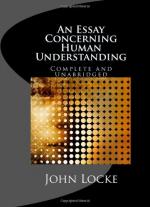
|
| Name: _________________________ | Period: ___________________ |
This quiz consists of 5 multiple choice and 5 short answer questions through Book II, Chapters 16-33.
Multiple Choice Questions
1. Where does Locke say our idea of number comes from?
(a) Our idea of variety.
(b) Our idea of origins.
(c) Our idea of unity.
(d) Our idea of derivation.
2. What does Locke say about the knowledge of how property rules should be established?
(a) It must be established anew each generation.
(b) It must be doubted.
(c) It must be learned.
(d) It should be scientifically evaluated.
3. How does Locke characterize perception?
(a) Complex.
(b) Self-aware.
(c) Incomplete.
(d) Basic.
4. What is substance, according to Locke?
(a) The essence of a thing.
(b) The abstraction of a thing.
(c) The history of a thing.
(d) Separation between things.
5. What consequence does the fact that knowledge is limited have on our knowledge, according to Locke?
(a) It does not invalidate it.
(b) It means that man has to devise better tools for experimenting.
(c) It obligates people to constant conversation.
(d) It limits the fields in which we can know anything.
Short Answer Questions
1. What is Locke really discussing in his discussion of pleasure and pain?
2. Where do pleasure and pain come from, according to Locke?
3. What does Locke claim separates mankind from all other creatures on earth?
4. How does Locke describe pleasure and pain?
5. What does Locke use to illustrate the difference between freedom and fate?
|
This section contains 226 words (approx. 1 page at 300 words per page) |

|




